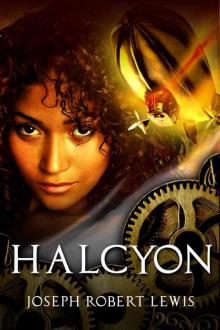- Home
- Joseph Robert Lewis
Europa Page 2
Europa Read online
Page 2
That was almost as bad as being trampled by a horse. Almost. But a horse has more than one hoof.
A moment later his eyes recovered enough to see the sheer walls of the buildings to his right and left rising up to meet the evening sky where angry clouds burned with shades of violet and crimson. He saw the dark figure of Ito Daisuke walk up beside him and stare down at him through cold, expressionless eyes as he pulled his sword from Omar’s chest.
The samurai inclined his head. “And now we know, Bakhoum-dono.”
With painful deliberation, Omar bared his teeth in a smile and whispered, “There was never any doubt, little brother.” And with a flick of his wrist, he swung up his seireiken to cut the Tiger in the ankle.
The samurai’s eyes widened the barest fraction, so little that Omar might have imagined it. But then the man’s eyes dimmed, his jaw went slack, and his body toppled over to the ground.
Omar inhaled slowly, feeling his lungs expanding whole and strong once again. He sat up and looked through the gash in his right sleeve to see his bloody skin already knitting back together just as the wound in his chest closed itself. The cut across his knee was already gone without leaving the slightest scar to mark its passing.
“Well, I may have the secret of eternal life, little brother, but it’s not pretty,” Omar muttered. He fished the little golden pendant from inside his clothes, inspected its wrinkled and veined surface, and then tucked it away again. “Cheating death hurts more than you’d think. But it’s still worth killing for, I suppose.”
No blood stained the samurai’s leg where the seireiken had cut him. Daisuke’s flesh had been seared at the moment it touched the blistering sun-steel, but the brief contact had been enough for the seireiken to draw out the aether in the man’s blood, and his soul along with it. A few pale yellow flames danced on the dead man’s trousers and Omar reached over to smother them with his own sleeve. Sighing, he leaned back again.
“Are you in there, little brother?” Omar gripped his sword tightly, summoning the vast sea of ghostly faces again. He sifted through the voices of the sages and priests, past the thieves and murderers, and through the strange group of newcomers from Daisuke’s sword, until finally he found Daisuke himself. The samurai’s soul felt like a cold void in the dead congregation, but then the shade with the scarred lip whispered:
I understand now, Bakhoum-dono.
“You beat my gladiator, and he was the strongest warrior I had.” Omar smiled briefly and sadly. “So I’ll be wanting your swordsmanship, little brother, sooner or later. I hope you’ll offer your skills freely. The alternative will be… unpleasant. For you.”
Omar stood up with a groan. With great care, he slid his bright white sword back into its clay-lined scabbard on his hip, dousing both its light and its heat. He glanced about, but the alley was just as deserted as before with no indication that anyone had seen or heard what had happened. He shifted Ito Daisuke’s body against the wall and covered it with a few bits of trash lying nearby, and walked away, leaving the beautiful katana under the body to be found by whatever vermin might happen by. He also took up the chipped and now-cold seireiken that the samurai had left on the ground, and he slipped it down through a grate into the shallow sewer below.
Hm. I’ll have to remember to come back for that, one day.
As he returned to the back door of the hotel, he picked up his pipe to find the leaves still smoldering and smoking. Omar smiled, set the pipe between his lips, and went inside to bed.
Chapter 2. Negotiations
The morning sun found Omar Bakhoum striding through the early press of Mazigh workmen and professional women as he angled uphill toward the airfield above the train station. The road leading up the hill plunged through a warehouse district, and on either side Omar saw teams of men moving sacks, loading wagons, and driving steam cranes to shift massive pallets of barrels and crates. He even paused to watch four men leading a massive hairy beast up the center of the lane. The animal stood twenty feet high and shambled along on its long-clawed knuckles, but it had sad cow-like eyes and a soft muzzle like a giant horse. It wore a heavy leather and iron harness tethered to a long wagon laden with massive brass pipes that must have weighed more than a ton each.
After the giant beast and its burden had passed, Omar crossed the road and passed through the tall iron gates of the airfield. He approached the small office beside the first hangar and spoke to a young lady in an orange jacket, who said that the airship he wanted was in the last hangar of the row.
He strode along the front of the hangars, peering into the first two to appreciate the massive cavern of each, though each was empty. And when he reached the doors of the third hangar, he stopped.
Omar stood there a long moment, just staring. The airship loomed above him in the shadows of the hangar like a great flying whale hovering effortlessly in the cool morning air. Its skin looked thick and wrinkled with all the layers of canvas and leather that were banded and lashed to it with brass rods and oiled ropes. Down on its belly where the craft kissed the earth he saw a beautifully crafted ship’s hull, an elegantly shaped arc of stained teak and polished brass and shining windows. Every fitting and corner was armored and riveted, and a small sort of cannon poked out from the starboard side.
He was still staring when a woman in a heavy leather jacket and canvas trousers emerged from the shadows and said, “Can I help you?”
“I’m looking for Captain Riuza Ngozi,” he said, sparing her a quick glance before resuming his study of the leviathan above them.
“You’ve found her.” She stuck out her hand. “And you are?”
He smiled broadly as he shook her hand. “Omar Bakhoum. It’s a pleasure to finally meet you, dear lady. I trust you’ve received my last few letters? The ones about your latest expedition?”
“Ah, Mister Bakhoum, yes.” She nodded slowly as she took her hand back and hooked her thumbs in her belt. She tilted her shaved head to the side as she said, “I did receive your letters, but I wasn’t expecting to meet with you today. When did you arrive in Tingis?”
“Just last night. When I heard you were about to depart on a new expedition beyond the glaciers, I decided it was time for me to come and lend a hand myself.”
“Lend a hand?” The captain frowned. “Sir, I’ve appreciated your correspondence and your help with our translations over the last few months, but our expeditions are carefully planned long in advance. And we’re leaving tomorrow morning. I’m afraid there isn’t time for you to help with this trip.”
“Oh, I’m sure there’s some small contribution I could make.” He reached into his right sleeve and pulled out a carefully folded and tied bundle of soft leather, which he handed to her.
Captain Ngozi took the bundle, removed the twine, and unfolded the leather. She hesitated, holding the soft sheet up to the light. “Where did you get this?”
“Rus.” Omar smiled and leaned around to look at the map with her. He pointed to the writing. “This is all in Rus, of course. A rather old and obscure dialect, as I understand it.”
“But this…” The captain traced the ink lines with her fingertips. “This shows the complete northern coastline of Europa. That’s impossible. It’s been buried under half a kilometer of ice for thousands of years. No one knows what it looks like anymore.”
“Sure, sure.” Omar nodded. “But once upon a time it wasn’t covered in ice, you know. The Rus folk used to live up there before the north was frozen. It took me ages to find this map. It’s positively ancient.”
“Then I don’t suppose anyone can read these markings,” the captain said.
“No, not really,” Omar said absently. “Except for me, of course. I speak half a dozen sorts of Rus. See here? This is a mountain called the Troll’s Hump, which is one ten-day from a lake called Woden’s Mirror. And a ten-day, by old Rus reckoning, was about two hundred of your kilometers.”
“This is very impressive, assuming it’s accurate.” Captain Ngozi carried the map
a few steps farther from the hangar to better catch the morning light. “How long would it take you to create a translated version of this map with modern measurements?”
Omar smiled. “Oh, I’m sorry, but I can’t say I have much interest in translating the whole map right now. Although I’m fairly certain I could be persuaded to translate a few bits and pieces of it at a time, as needed. I’m sure you catch my meaning, dear lady.”
She lowered the map to look at him. “You want to come with us?”
“Absolutely.”
“You’re serious? You want to spend the next two weeks inside a little metal box with four strangers, eating cold rations and shivering through the long Europan nights while entire legions of ghosts wander the ice below us? That’s what you want to do?”
“It doesn’t sound particularly appealing, no, but I do want to see this.” He lifted the map in her hand and touched a small island at the upper edge of the leather. “This island here. The Rus call it Ysland.”
“We’ve never gone that far north before. It must be a thousand kilometers beyond our current flight plan. And besides, we’re already prepped to survey the eastern coast of this island here. Alba.” She indicated a larger island to the south of Omar’s destination.
“Well, that’ll be fine. I’m not looking to build a summer house up there. I’d just like to see whether my little Ysland is really there, and whether it’s buried in the ice. That’s all. We don’t even need to get very close. Only close enough to see whether it’s frozen over.”
The captain narrowed her eyes. “It’s at the top of the world. Why wouldn’t it be frozen over?”
Omar winked at her. “I have a theory or two about that. But for now, I’d just like to take a quick look at it.”
Riuza frowned but shrugged and nodded as she studied the Rus map. “Well, I’ll have to do the math on it, but we can probably come within sight of your island by adding just one or two extra days, depending on the weather. If that’s all you want to do, well, that may be possible. And you really want to sit in the Finch for two weeks just to take one quick look at this Ysland?”
“Absolutely, dear lady. And in return, I may just find the time to make you a properly translated map, complete with your Mazigh measurements and markings.” Omar took back his map, noting the hunger in her eyes as she returned his Rus treasure. “Perhaps I should add that in addition to speaking more Europan languages than you’ve ever heard of, I’m also an experienced military surgeon, a deft tailor, and cook of no small skill. My hummus is smoother than silk.”
“Hm. I’ll need to discuss it with the rest of the team,” she said. “Come back this afternoon around three o’clock and we’ll let you know our decision.”
“Is the team here now?” he asked innocently as he glanced around the dark hangar. In the distance he heard a metal tool fall to the concrete floor. The clattering noise echoed across the chamber.
The captain sighed. “My engineer is here, but the others won’t be here for another hour at least. But we do have a lot of work to prepare for the launch, and we’ll need to discuss the matter in private.”
“Of course, of course,” Omar said. “I’ll just be out here. You can come get me when you’re ready.”
“You’re going to wait here all day? Fine, suit yourself. Just stay out of the way of the ground crew.” Captain Ngozi frowned as she went back inside the hangar.
Omar sauntered out across the cool dew-speckled grass of the airfield. From the far side of the field he could look down on the long curved roof of the train station. Its iron girding stood in stark rows of green-painted beams, and the center of the roof was paneled in shining glass windows that spilled the morning light down onto the platform and the rails below.
Beyond the train station were two more streets of shops and warehouses before the continent of Ifrica came to an abrupt halt at the edge of the Strait of Tarifa. To the west, the strait flooded out in sparkling wavelets to the vast Atlanteen Ocean, and to the east the waters shone a bit bluer in the busy Middle Sea. All across the waters he could see the tiny white sails of the fishing boats and the huge steaming bulks of the merchantmen chugging off to España, Italia, and Numidia.
His left hand dropped absently to his seireiken, allowing the thousands of shadow faces to appear around him in a great congregation of the dead, all staring at him in respectful silence. But one specter tore away from the others and strode into the empty space at Omar’s side.
“Hello again, little brother.”
The dead samurai gazed toward the east and said, Why are you taking us to this Ysland?
Omar chuckled softly. “Taking you? Are you my poor little child now, to be dragged about on my travels, pouting and moaning? Please, Daisuke, you were a Tiger of the eastern temple. You held a seireiken. You know what your role is in the world now.”
The young warrior frowned at him. Very well. Why are you going to Ysland?
“To find the truth. The last truth. The one truth,” Omar muttered. “Yes, I am immortal. Yes, I know something about aether and sun-steel and soul-breaking. But there are so many questions still unanswered.” He smiled gently. “And I have been looking for those answers for a very long time, indeed.”
How long?
“Over four thousand years.”
And Ysland?
“I’ve been everywhere in the world, or nearly so,” Omar said. “From the palaces of Nippon to the streets of Tingis, right here. I’ve studied with doctors and sages and priests in a hundred lands, for dozens of centuries. And I still don’t know anything. What is aether? Where does it come from? Did the sun-steel really fall from the sky? And why can these things reveal and enslave a human soul? Haven’t you ever wondered about it all?”
Of course, Daisuke said. But these questions are as timeless as they are pointless. It is the way of the world. Our task is merely to try to use these things, perhaps even to master them, but not to comprehend them. We’re only men, not gods.
“Aha!” Omar raised a triumphant finger in the ghost’s face. “But what if we could ask God? What if we could follow the trail of aether and sun-steel to the very gates of paradise and meet God? Not in a vision, not at the end of the world, but here and now!”
Daisuke turned away to study the sky again. You aim very high.
“Maybe I do, maybe I don’t. But maybe this is what God wants, for someone to find these signs and wonders and follow them to the truth, the real truth, the ultimate truth in the world.”
And what truth is that?
“I have no idea, little brother.” Omar grinned. “I’ve been looking for that truth for half an eon and found only mist, metal, and ghosts. But Ysland! Ysland could be the answer. Have you heard of Ysland? No, of course not. It’s one of those legendary places, like Atlantia, that vanished into the sea. But the stories! If Ysland exists, then the people there could have all the answers, all the truths of the universe, just waiting for us to come and discover them. The stories say that Ysland defies the ice, that it glows with an otherworldly heat.”
You think they have enough sun-steel to warm an entire island?
“Exactly!” Omar couldn’t stop grinning. It had been years since he had dared to speak so openly about his designs to another person, living or otherwise. “Ysland may even be the source of the sun-steel, and the aether as well. Maybe I’m wrong. Maybe they’re just stories. But think of the possibilities if it is all true. The secrets of the aether and the sun-steel! The true origin, nature, and purpose of the human soul revealed! And perhaps even the gates of paradise thrown wide for us mere humans to walk through and meet our creator, in this life, in this world, to tell us the meaning of it all.”
Daisuke said nothing, and Omar joined him in gazing at the horizon. He was still looking off to the east when a speck appeared in the sky. It grew slowly and steadily, a single circular blot in the bright morning clouds. Eventually the soft droning of the distant airship’s propellers rose above the cries of the sea gulls and the dull r
oaring of the city traffic. A few minutes later the flying machine began to descend over the airfield, and Omar could see the smooth skin of the ship’s white belly and the pale outline of the tiny gondola clinging to its underside.
“That’s the Halcyon,” a voice called out.
Omar looked down at the young woman sauntering toward him. Behind her a team of young men in orange jumpsuits were striding across the field toward the eastern mooring masts to meet the incoming ship. The young woman came up beside him and leaned back against the rough wooden fence at the edge of the field to watch the landing. She had a soft face and tiny hands, and a long blue scarf was tied back into her hair, which bounced around her shoulders in thick brown curls.
“It looks smaller than the one in the hangar,” he said.
“Well hell, everything’s smaller than the Finch,” the woman said with a grin. “But Halcyon’s even smaller than the other couriers. That’s Isoke Geroubi’s boat. She was the captain of the Shearwater when it exploded, just half a little way over there.” The woman pointed toward the city harbor. “Blew her engineer to pieces.”
Omar winced. “That’s awful. But the captain survived?”
“More or less. She’s not the same now, though. Isoke’s completely obsessed with safety regs and procedures and technical specs. She’s always fighting with the commander about one thing or another.” The woman shook her head. Then suddenly her face brightened as she held out her hand. “Lieutenant Morayo Osaze, flight engineer of the Frost Finch. Pleased to meet you.”
“Omar Bakhoum.” He shook her hand.
“So I’m supposed to bring you back over to the hangar now,” Morayo said. “The captain wants to give you a long speech about protocols and responsibilities and safety procedures before she tells you that you can come with us. Oops.” The engineer winked at him. “I probably wasn’t supposed to tell you that last part. Riuza’s a straight shooter and an ace pilot, but she gets a little boring and controlling sometimes. Still, she’s a hell of a lot better than Isoke.”

 Daphne and the Silver Ash: A Fairy Tale
Daphne and the Silver Ash: A Fairy Tale_preview.jpg) Wreck of the Frost Finch (Aetherium, Book 0 of 7)
Wreck of the Frost Finch (Aetherium, Book 0 of 7) Chimera The Complete Duet
Chimera The Complete Duet Elf Saga: Bloodlines (Part 1: Curse of the Jaguar)
Elf Saga: Bloodlines (Part 1: Curse of the Jaguar) Freya the Huntress (Europa #2: A Dark Fantasy)
Freya the Huntress (Europa #2: A Dark Fantasy) Chimera esd-7
Chimera esd-7 Halcyon est-1
Halcyon est-1 Europa
Europa The Dragon and the Lotus (Chimera #1)
The Dragon and the Lotus (Chimera #1) Halcyon (The Complete Trilogy)
Halcyon (The Complete Trilogy) Ultraviolet
Ultraviolet Wren the Fox Witch es-6
Wren the Fox Witch es-6 Wren the Fox Witch (Europa #3: A Dark Fantasy)
Wren the Fox Witch (Europa #3: A Dark Fantasy) Omar the Immortal es-4
Omar the Immortal es-4 Aetherium (Omnibus Edition)
Aetherium (Omnibus Edition) Freya the Huntress es-5
Freya the Huntress es-5